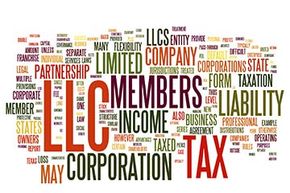You've taken the plunge and created your own business. Now you need to figure out, for U.S. tax purposes, in which legal form it will operate. The main types from which to choose are a sole proprietorship, general partnership, limited liability company (LLC), C corporation and S corporation. One of the most popular choices from this group is the LLC.
Many business owners favor LLCs, created by a state filing, because they're easy to operate. A more intimate type of business set-up than a corporation, all of an LLC's profits and losses are reported on the owner(s) personal tax returns; the LLC itself doesn't pay federal or state income taxes. A corporation, in contrast, is a separate tax entity from its owner(s) and pays taxes. Because an LLC's profits and losses are run through the owners' tax returns, the Internal Revenue Service (IRS) calls LLCs pass-through entities. The IRS also uses this term for partnerships and sole proprietorships.
Advertisement
LLCs are also popular because they shield business owners from being personally liable for business debts. If your LLC incurs debt, only its assets can be used for repayment. (Of course, this is assuming you haven't personally guaranteed something -- say, an equipment purchase or lease.) Another LLC benefit? If you co-own an LLC and your partner becomes saddled with personal debt, his creditors won't be able to touch the business [source: Bradie, Bradie and Bradie].
Many LLC owners are self-employed, so no taxes are withheld from their income. Tax law requires they make quarterly estimated-tax payments to the IRS and their state. Quarterly self-employment taxes to cover Medicare and Social Security must also be paid. The one exception to the self-employment tax rule comes if a member of a multi-owner LLC is merely an investor who doesn't provide any services or make any decisions. In some cases, this person may be exempt from the tax [source: Beesley].
A final point to keep in mind is that some states charge LLCs an annual tax on earned income that's in addition to the income tax you pay on your personal return. Others levy an annual LLC fee (aka a franchise tax, registration fee or renewal fee), typically about $100. These fees aren't related to the LLC's income [sources: Beesley, Laurence].
Think an LLC is for you? Let's look at the various forms it can take.
Advertisement



